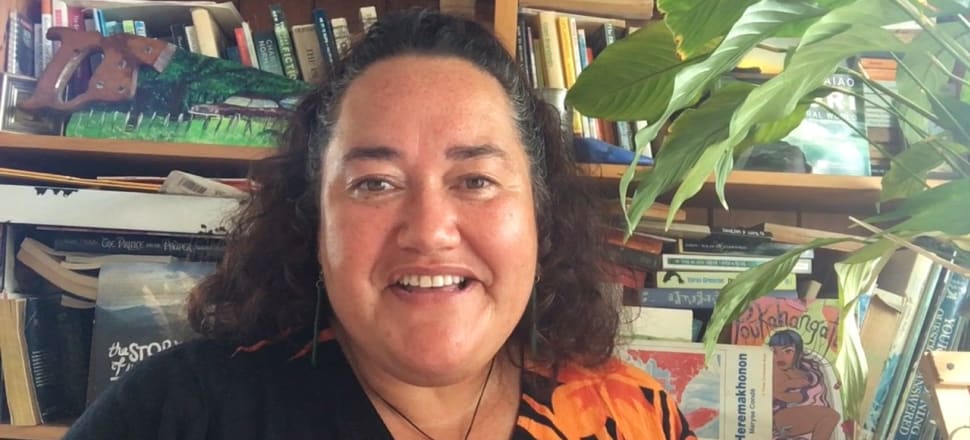
The majority of MPs on a Parliamentary committee has recommended the Three Waters reforms proceed. It was the submission from a Hawke's Bay mother that moved them most.
Shelley Burne-Field worked at Central Hawke's Bay District Council. For years, she would drive into work from the tiny township of Takapau, taking with her a jar of black water from her kitchen tap. She showed the water to the councillors, she showed it to the engineers, she left it sitting on the table in the staff lunch room, putting people off their food.
But nothing changed, until the day she brought her 7-year-old son home from hospital after having his tonsils out, with strict doctor's instructions to keep him well hydrated. She turned on the tap – and black water gushed out. "I broke down in tears."
It was that water that she described to MPs considering the Three Waters reforms; she gathered up a handful of the table cloth in the hearing room – as black as this, she told them.
READ MORE: ► The gathering stormwaters: Pressure to reduce reforms to just Two Waters ► Councils sign up for Three Waters funding in final days before voting closes ► Councils fear loss of big employers under Three Waters reforms
Burne-Field sent her husband out to drive to the nearest big town, Waipukurau, to buy some bottled water. The council water supply was so high in manganese that it was not only discoloured, but the accumulation was a potential health risk to children.
Fixing it was more than 10 years down the council's priority list. It wasn't just Takapau; nearby Pōrangahau had the same problem with its supply.
Then a few months later in 2016, just 70km up state highway 2, Havelock North suffered the campylobacteriosis outbreak that claimed the lives of four residents and made 5,500 more sick. It was that outbreak that sparked the Three Waters reforms that will be debated in Parliament this month.
Burne-Field was visiting the regional hospital, when she got talking to an elderly man. His wife had been admitted to intensive care, seriously ill with Guillain-Barre syndrome. That's an auto-immune disorder that can be contracted after a gastro infection; at least three people are known to have got the syndrome from the Havelock water outbreak.
"He was just beside himself, and he couldn't understand how this could happen – that the council hadn't told people the danger from the water. It made be compare my experience, and realise how life and death can be bargained with, if it makes an organisation look bad."
Her account to Parliament's finance and expenditure select committee, hearing submissions in Hastings, is volunteered by pro-reform MPs as influencing their thinking. Because that day in Takapau, she decided to run for council.
When she was elected, she tells Newsroom, older and more experienced councillors laughed at her determination to fix the water supplies in Takapau and Pōrangahau. But she persevered and, in 2017, the council voted to prioritise the two tainted water supplies for remedial work.
After years of complaints and letters to council and jars of black water on lunch room tables, that work was finally done a year later. The water in Takapau no longer runs black – though Burne-Field is concerned it still doesn't always meet other health standards.
This was not just aesthetic: the continued consumption of high levels of manganese builds up in the bodies of children, in particular. That was why Burne-Field was especially concerned about her sick son.
It's necessary to human survival in small trace quantities, but too much of it can be toxic according to Lenntech, a world-wide water treatment solutions company. High manganese concentrations in council drinking supplies have also been a problem in Napier and, most recently, Timaru.
Rural contractor Temple Water says it regularly find private supplies, too, containing levels of manganese higher than the NZ Drinking Water Standard of 0.04mg/l. "The health effects of consuming too much manganese aren’t yet conclusive however it has been linked to possible neurological damage when present at certain levels," the company says. "That aside, manganese contaminated water is extremely undesirable to use in the home and creates a bitter metallic taste that can make the water unpleasant to drink for both humans and farm animals."
The challenge for Burne-Field – and it was put to her in the committee hearing by Act MP Simon Court – is whether the Three Waters reforms would make a difference?
Would Takapau or Pōrangahau or Havelock North or Napier or Timaru get their water cleaned up any faster if the infrastructure was managed by one of four big new incorporations, as the Water Services Entities Bill provides, rather than by their local council?
Burne-Field says, yes. She says local councils are too close, too political, too compromised, to make independent health and infrastructure decisions based on good scientific evidence.
When she worked for the council, she recalls, there were problems with water turbidity that would usually prompt a "boil water" notice. So she and another woman, a water engineer, went to the chief executive to advise him to issue the notice.
He stalled and deferred and ultimately refused. It was, she says, negative publicity that he didn't want.
She grew up in central Hawke's Bay, and after working in Australia she returned to the community of Takapau. "I love it, it's paradise. The water is running clear, and I hope it's meeting all the standards now. But if we hadn't gone in there and fought for it, nothing would have changed.
"I know some organisations can be about empire-building, but I think the Three Waters reform is looking to do the right thing for the communities.
"It's looking at health and science and putting it in the hands of experts. It's taking it out of the hands of the politicians."







